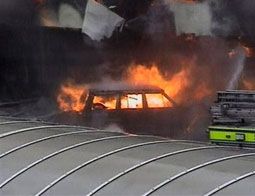By Jeffrey Stinson
USA TODAY
Related: Glasgow attack seen linked to London bombs
LONDON — The recent attempted car bomb attacks in Britain demonstrate how quickly terrorists adapt and how they can often achieve a degree of success even when they fail.

Two men rammed a flaming Jeep into a Glasgow airport Saturday. (AP Photo)
That’s what terrorism analysts say as police continue to uncover clues in the crimes. Although two cars packed with explosives in London’s busy West End nightclub area were discovered Friday before they blew up, al-Qaeda succeeded in calling renewed attention to its anti-Western message and the presence of British troops in Iraq.
Similarly, attackers failed to cause any deaths when they tried to ram a flaming car through the doors of Glasgow Airport on Saturday, but travel was disrupted throughout Britain. U.S. airports also increased security.
British police have said the plots in Glasgow and London were related. Prime Minister Gordon Brown has said the militants behind the attacks were associated with al-Qaeda, though it was not yet clear to what degree.
Peter Clarke, head of the Metropolitan Police’s counterterrorism unit, said it could “take days and weeks” to understand “the methods used by the terrorists, the way they planned their attacks and the network to which they belong.”
Terrorism analysts said the use of gasoline and nails to try to make the explosions more lethal indicates terrorists may have learned to get around Britain’s efforts to make more sophisticated explosives difficult to acquire.
Britain cracked down on bombmaking material, including fertilizer, after police thwarted a plot in 2004 to bomb a London nightclub, shopping center, power plants and other targets using fertilizer bombs. Prosecutors said those plotters planned to use 1,300 pounds of ammonium nitrate fertilizer to make explosives and had obtained much of it.
“So you adapt quickly, you do it the easiest way possible,” King says. “You get gas, nails and propane. It’s a lot easier to do than a complicated plot — and it’s very effective.”
The use of car bombs similar to those used by terrorists in Iraq demonstrates that killing methods are quickly picked up by terrorists elsewhere, says Michael Kenney of Penn State University, who has written about terrorism networks in the USA and Europe. That leaves governments in an “impossible game of playing catch-up” with new modes of attack, he says.
Islamic terrorism analyst Magnus Ranstorp at the Swedish National Defense College says he suspects the original plot against England and Scotland had more sophistication than its failure would indicate.
Police found a mobile phone in the first car that was defused early Friday morning in London, suggesting the bomb was to be triggered from afar at the same time that nightclubbers emerged.
A first blast could have killed some people, and then a second car bomb could have killed hundreds more as they streamed out to the street to see what happened, Ranstorp said.
Ranstorp said he suspects that when the London plot failed, the perpetrators became desperate, and rather than accept failure, they decided to attack the airport in Glasgow by simply ramming it.
After their car failed to break through airport doors, one of the attackers doused himself with gasoline and continued to battle police while flames burned his body.
“The bottom line is these guys are adaptable,” Kenney says. “They are going to do whatever it takes to get the effect — even if it means setting yourself on fire.”
Copyright 2007 Gannett Company, Inc.

